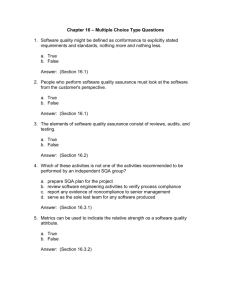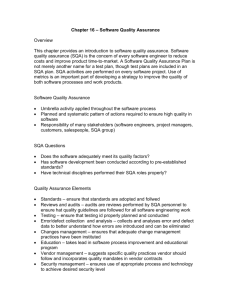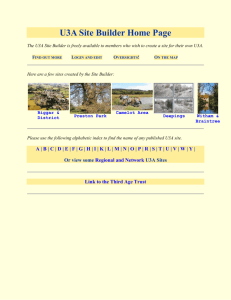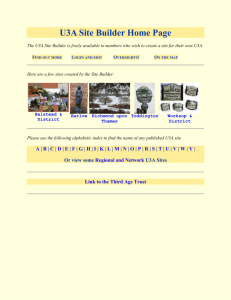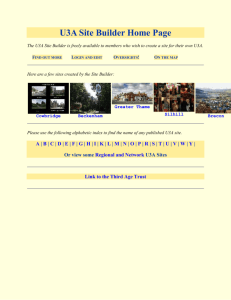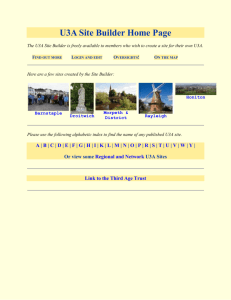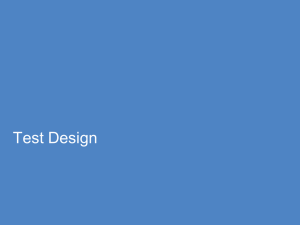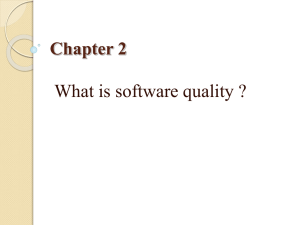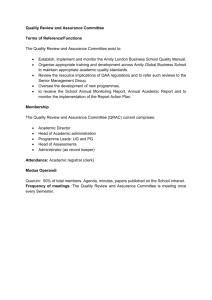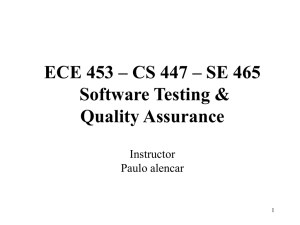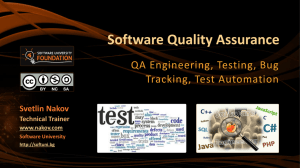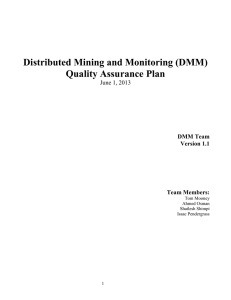Code No.: MCA 333 L T C Paper: Software Quality Management
advertisement
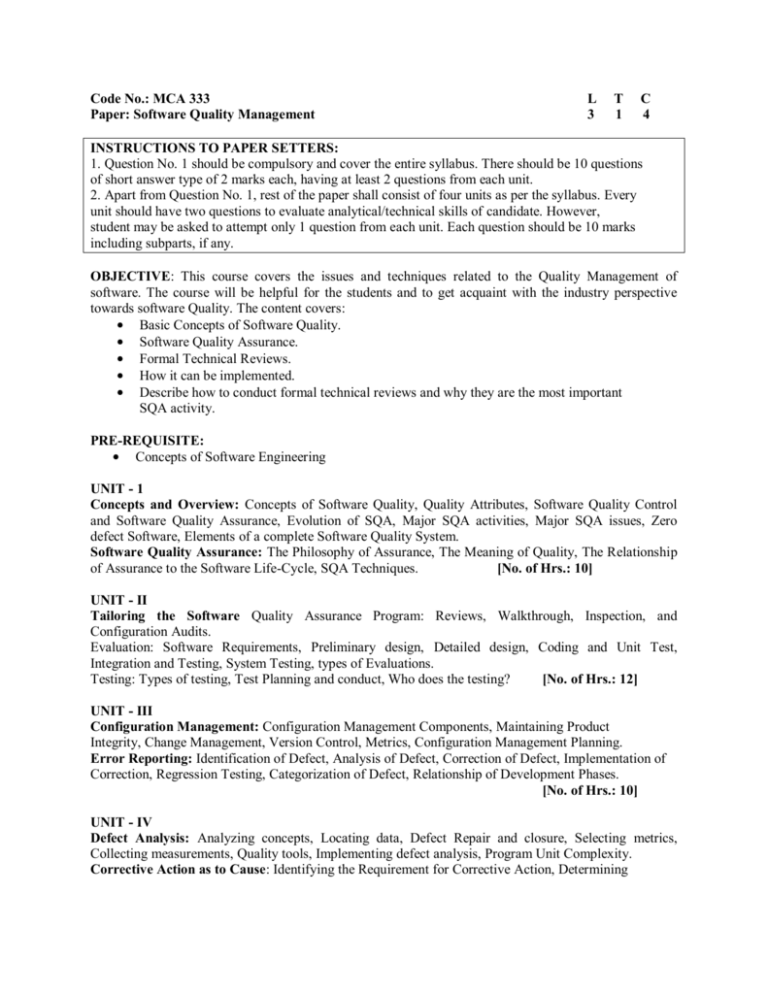
Code No.: MCA 333 Paper: Software Quality Management L 3 T 1 C 4 INSTRUCTIONS TO PAPER SETTERS: 1. Question No. 1 should be compulsory and cover the entire syllabus. There should be 10 questions of short answer type of 2 marks each, having at least 2 questions from each unit. 2. Apart from Question No. 1, rest of the paper shall consist of four units as per the syllabus. Every unit should have two questions to evaluate analytical/technical skills of candidate. However, student may be asked to attempt only 1 question from each unit. Each question should be 10 marks including subparts, if any. OBJECTIVE: This course covers the issues and techniques related to the Quality Management of software. The course will be helpful for the students and to get acquaint with the industry perspective towards software Quality. The content covers: Basic Concepts of Software Quality. Software Quality Assurance. Formal Technical Reviews. How it can be implemented. Describe how to conduct formal technical reviews and why they are the most important SQA activity. PRE-REQUISITE: Concepts of Software Engineering UNIT - 1 Concepts and Overview: Concepts of Software Quality, Quality Attributes, Software Quality Control and Software Quality Assurance, Evolution of SQA, Major SQA activities, Major SQA issues, Zero defect Software, Elements of a complete Software Quality System. Software Quality Assurance: The Philosophy of Assurance, The Meaning of Quality, The Relationship of Assurance to the Software Life-Cycle, SQA Techniques. [No. of Hrs.: 10] UNIT - II Tailoring the Software Quality Assurance Program: Reviews, Walkthrough, Inspection, and Configuration Audits. Evaluation: Software Requirements, Preliminary design, Detailed design, Coding and Unit Test, Integration and Testing, System Testing, types of Evaluations. Testing: Types of testing, Test Planning and conduct, Who does the testing? [No. of Hrs.: 12] UNIT - III Configuration Management: Configuration Management Components, Maintaining Product Integrity, Change Management, Version Control, Metrics, Configuration Management Planning. Error Reporting: Identification of Defect, Analysis of Defect, Correction of Defect, Implementation of Correction, Regression Testing, Categorization of Defect, Relationship of Development Phases. [No. of Hrs.: 10] UNIT - IV Defect Analysis: Analyzing concepts, Locating data, Defect Repair and closure, Selecting metrics, Collecting measurements, Quality tools, Implementing defect analysis, Program Unit Complexity. Corrective Action as to Cause: Identifying the Requirement for Corrective Action, Determining the Action to be Taken, Implementing the Correcting the corrective Action, Periodic Review of Actions Taken. Traceability, Records, Software Quality Program Planning, Software Quality System Plan, Software Documentation. [No. of Hrs.: 10] TEXT BOOKS: 1. Robert Dunn, “Software Quality Concepts and Plans”, Prentice-Hall, 1990. 2. Alan Gillies, “Software Quality, Theory and Management”, Chapman and Hall, 1992. 3. John W. Horch , “Practical Guide to Software Quality System”, Artech House, 2003. REFERENCE: 1. K.K. Aggarwal & Yogesh Singh, “Software Engineering”, New Age International Publishers, 3rd Ed., 2008. 2. Daniel Freedman, Gerald Weinberg, “Handbook of Walkthroughs, Inspections and Technical Reviews”, Dorset House Publishing, 1990. 3. Tom Gilb, “Principles of Software Engineering Management”, Addison-Wesley, 1988. 4. Tom Gilb, Dorothy Graham, “Software Inspection” Addison-Wesley, 1993. 5. Watts Humphrey, “Managing the Software Process”, Addison-Wesley, 1990. 6. Watts Humphrey, “A Discipline for Software Engineering”, Addison-Wesley, 1995. 7. Arthur Lowell, “Improving Software Quality An Insiders guide to TQM”, Wiley & Sons,1993. 8. Mordechai Ben-Menachem, Gary S. Marless,“Software Quality Producing Practical Consistent Software”, Cengage Learning, 2nd Ed., 2009. 9. Stephen H. Kan, “Metrics and Models in Software Quality Engineering”, Pearson, 2nd Ed., 2003. Syllabus of Master of Computer Applications (MCA), approved by MCA Coordination Committee on 7 th May 2010 & Sub-Committee Academic Council held on 31st May 2010. W.e.f. academic session 2010-11
